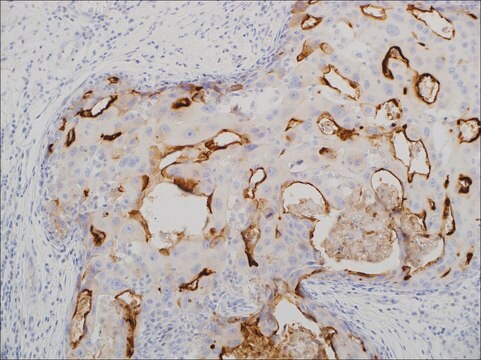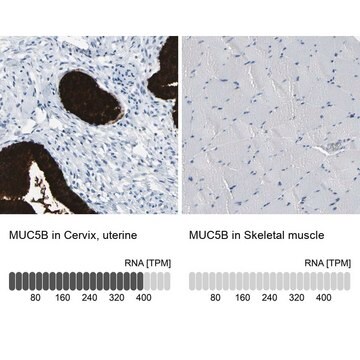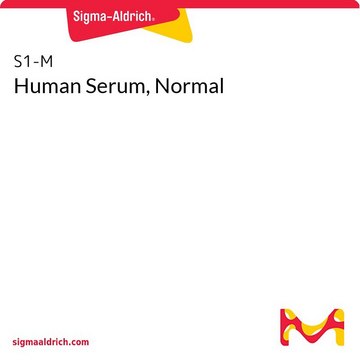おすすめの製品
由来生物
mouse
品質水準
100
500
結合体
unconjugated
抗体製品の状態
culture supernatant
抗体製品タイプ
primary antibodies
クローン
MRQ-18, monoclonal
詳細
For In Vitro Diagnostic Use in Select Regions (See Chart)
フォーム
buffered aqueous solution
化学種の反応性
human
包装
vial of 0.1 mL concentrate (291M-14)
vial of 0.5 mL concentrate (291M-15)
bottle of 1.0 mL predilute (291M-17)
vial of 1.0 mL concentrate (291M-16)
bottle of 7.0 mL predilute (291M-18)
メーカー/製品名
Cell Marque®
テクニック
immunohistochemistry (formalin-fixed, paraffin-embedded sections): 1:50-1:200
アイソタイプ
IgG1κ
コントロール
colon
輸送温度
wet ice
保管温度
2-8°C
視覚化
cytoplasmic
遺伝子情報
human ... MUC2(4583)
詳細
Mucins are a diverse group of complex, highly glycosylated extracellular proteins. Mucin 2 (MUC2) protects the gastric and intestinal epithelium from chemical and mechanical injury. Anti-MUC2 reactivity is normally seen in goblet cells of the small intestine and colon and is associated with mucinous carcinomas, including those of the gastrointestinal tract and ovary. MUC2 immunohistochemistry is useful for identifying colonic, gastric, and esophageal carcinomas.
Mucins are high molecular weight glycoproteins which constitute the major component of the mucus layer that protects the gastric epithelium from chemical and mechanical aggressions. In humans, at least 14 mucin genes have been identified that code for the mucin proteins. They are designated as MUC1, MUC2, MUC3, MUC4, MUC5AC, MUC5B , MUC6 , MUC7, MUC8, MUC9, MUC11, MUC12, MUC13 and MUC16. Mucins share a common feature of a tandem-repeat domain rich in serine and threonine residues. These amino acid residues are potential O-glycosylation sites for attachment of the O-glycan chains that constitute up to 80% of the molecular weight of the final mucin glycoprotein.
The heterogeneous pattern of mucin expression, including the expression of the intestinal mucin MUC2, may provide new insights into the differentiation pathways of gastric carcinoma. The pattern of mucin expression may also be used as a clue to bring new insights into the biological behaviour of distinct clinicopathological entities related to the localisation of gastric carcinoma, namely proximal and distal gastric carcinomas. Pinto-de-Sousa et al. have shown in a comprehensive study of gastric carcinomas evaluated for expression of several mucins (MUC1, MUC2, MUC5AC and MUC6) that: (1) mucin expression is associated with tumour type (MUC5AC with diffuse and infiltrative carcinomas and MUC2 with mucinous carcinomas) but not with the clinico-biological behaviour of the tumours; and (2) mucin expression is associated with tumour location (MUC5AC with antrum carcinomas and MUC2 with cardia carcinomas), indirectly reflecting differences in tumour differentiation according to tumour location.
The following generalities apply to the patterns of Mucin expression:
MUC1 expression: apical surfaces of most epithelial cells in breast, GI, respiratory, and GU tracts.
MUC2 expression: specifically expressed in goblet cells of the small intestine & colon.
Colonic CAs – 65%, Gastric CAs – 42%, Esophageal CAs – 17%
Rare outside of GI tract – with exception of; mucinous ca of breast, clear cell-type CAs of the ovary.
The heterogeneous pattern of mucin expression, including the expression of the intestinal mucin MUC2, may provide new insights into the differentiation pathways of gastric carcinoma. The pattern of mucin expression may also be used as a clue to bring new insights into the biological behaviour of distinct clinicopathological entities related to the localisation of gastric carcinoma, namely proximal and distal gastric carcinomas. Pinto-de-Sousa et al. have shown in a comprehensive study of gastric carcinomas evaluated for expression of several mucins (MUC1, MUC2, MUC5AC and MUC6) that: (1) mucin expression is associated with tumour type (MUC5AC with diffuse and infiltrative carcinomas and MUC2 with mucinous carcinomas) but not with the clinico-biological behaviour of the tumours; and (2) mucin expression is associated with tumour location (MUC5AC with antrum carcinomas and MUC2 with cardia carcinomas), indirectly reflecting differences in tumour differentiation according to tumour location.
The following generalities apply to the patterns of Mucin expression:
MUC1 expression: apical surfaces of most epithelial cells in breast, GI, respiratory, and GU tracts.
MUC2 expression: specifically expressed in goblet cells of the small intestine & colon.
Colonic CAs – 65%, Gastric CAs – 42%, Esophageal CAs – 17%
Rare outside of GI tract – with exception of; mucinous ca of breast, clear cell-type CAs of the ovary.
品質
 IVD |  IVD |  IVD |  RUO |
関連事項
MUC2 Positive Control Slides, Product No. 291S, are available for immunohistochemistry (formalin-fixed, paraffin-embedded sections).
物理的形状
Solution in Tris Buffer, pH 7.3-7.7, with 1% BSA and <0.1% Sodium Azide
調製ノート
Download the IFU specific to your product lot and formatNote: This requires a keycode which can be found on your packaging or product label.
その他情報
For Technical Service please contact: 800-665-7284 or email: service@cellmarque.com
法的情報
Cell Marque is a registered trademark of Merck KGaA, Darmstadt, Germany
適切な製品が見つかりませんか。
製品選択ツール.をお試しください
最新バージョンのいずれかを選択してください:
試験成績書(COA)
Lot/Batch Number
Emad A Rakha et al.
Modern pathology : an official journal of the United States and Canadian Academy of Pathology, Inc, 18(10), 1295-1304 (2005-06-25)
Mucins are a large family of glycoproteins expressed by many epithelial cells and their malignant counterparts. Much interest has been focused on expression of its members in breast cancer because of their potential role as prognostic indicators and their involvement
Seog-Yun Park et al.
Archives of pathology & laboratory medicine, 131(10), 1561-1567 (2007-10-10)
Although identification of the primary tumor in patients with metastatic adenocarcinoma has a profound clinical impact, diagnosing the organ of origin is frequently difficult. Because none of the individual immunohistochemical markers used for tissue identification are both site specific and
P Chaves et al.
Diseases of the esophagus : official journal of the International Society for Diseases of the Esophagus, 18(6), 383-387 (2005-12-13)
Intestinal metaplasia is a prerequisite criterion for the diagnosis of Barrett's metaplasia and the sole columnar esophageal lining associated with malignancy. It is recognized by the presence of goblet cells, but columnar non-goblet elements, producing gastric or intestinal proteins, are
Fionnuala P O'Connell et al.
Archives of pathology & laboratory medicine, 129(3), 338-347 (2005-03-02)
Breast carcinoma often metastasizes to the gastrointestinal tract, especially the stomach, where it is frequently difficult to distinguish from a primary gastric carcinoma. To evaluate the utility of immunohistochemical stains in differentiating primary gastric carcinomas from metastatic breast carcinomas. Mucosal
T Mizoshita et al.
Histology and histopathology, 22(3), 251-260 (2006-12-14)
We have previously demonstrated links between clinicopathological findings and phenotypes using several gastric and intestinal phenotypic markers in stomach and pancreatic cancers. However, the clinicopathological significance of the phenotype and Cdx2 expression has hitherto remained unclear in colorectal carcinogenesis. We
ライフサイエンス、有機合成、材料科学、クロマトグラフィー、分析など、あらゆる分野の研究に経験のあるメンバーがおります。.
製品に関するお問い合わせはこちら(テクニカルサービス)


